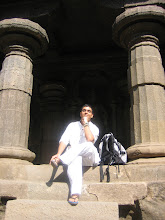It's the bridge that flows and not the water.
-Shan-hui (善慧)
Thanks to Fred for sharing this!

A demonstration of Huang Po’s fearlessness is given in one of P’ei Hsiu’s anecdotes. His master was attending an assembly at the Bureau of the Imperial Salt Commissioners in the presence of the Emperor. The Son of Heaven noticed Huang Po make three bows before a statue of the Buddha and asked him what he expected to gain from this. The Emperor must have been aware of his [Huang-Po's] general teaching that all rituals are a waste of time since all is the Buddha-mind. Huang Po replied that it was his custom to show respect in this way. But the Imperial grandee insisted on a doctrinal answer.The Buddha taught that mindlessly clinging to rites and rituals (Pali: sīlabbataparāmāsa) is one of the Ten Fetters (samyojana) which keeps us trapped in the cycle of suffering. For those with a deeply rooted suspicion of "organized religion", this teaching is exactly what the doctor ordered. There is, however, a very interesting follow up to this concept. In addition to teaching about the danger of clinging to rites and rituals, the Buddha also taught that nagging skeptical doubt (vicikicchā) with regard to the Dharma is one of the Five Hindrances (pañca nīvaraṇāni) that impede our ability to practice and free ourselves from suffering.
"What purpose does it serve?" he persisted, whereupon Huang Po slapped him. "You are uncouth!",� cried the Emperor.
"What?!" rejoined the master, "You are making a distinction between uncouth and refined?",� and another slap landed on the Imperial visage. It is reported that the Emperor withdrew in the face of this onslaught and Huang Po went on his way unmolested, a remarkable fact, indeed for the times.
And why not? Because, Subhuti, if these fearless bodhisattvas created the perception of a dharma, they would be attached to a self, a being, a life, and a soul. Likewise, if they created the perception of no dharma, they would be attached to a self, a being, a life, and a soul.
And why not? Because surely, Subhuti, fearless bodhisattvas do not cling to a dharma, much less no dharma. This is the meaning behind the Tathagatha's saying, "A dharma teaching is like a raft. If you should let go of dharmas, how much more so no-dharmas'?

I think the most pressing issue facing Buddhism in the West is twofold. One part is that there are many Western Buddhist authors who somehow-because of their experience, or being students of Buddhism, or teachers of Buddhism for the last twenty or thirty years-are calling for a change in the way that Buddhism is taught. Their thinking is quite odd in that, based on their little bit of twenty or thirty years, or even if its forty years of being Buddhists, they think they're smarter than the 2,500-year-old tradition that has proven so worthwhile. They were turned on to this tradition when they were young, and now that they're old, because they're dissatisfied for one reason or another, they want to change it and edit it and take out the parts of it they don't like. Yes, sometimes they make intelligent observations, but I think it's extremely premature to make changes in the way Buddhism has been taught just because it's come to the West. It's extremely premature because what's been presented so far is just the tip of the iceberg of the teachings; it's not possible for the full transmission of Buddhism to take place in such a short time.I think Berchloz's assessment is dead on, particularly the part about people who have been practicing a few decades thinking they're smarter than a 2,500-year-old tradition. It's a fact that the Buddhadharma will change now that it's reached the West. How it will morph into a new guise is unclear but we can already see some developments that are still in the embryonic phase. I'll name a few:
Another thing that I think is problematic in the West is this idea that Buddhism is an incomplete teaching because it doesn't deal with psychological issues. There are many avowed Buddhists who feel that without psychology, Buddhism doesn't work. That's a ridiculous thing to say, but it's said; there are dozens of books on it. The idea that the post-Freudian era has produced some great achievement is, to my way of looking at things, a joke compared to what Buddhism has done. Yes, there are people who have psychological issues. And no, meditation won't necessarily help their psychological issues. But there are other aspects of Buddhism, including a relationship with a good teacher, that in fact do deal with people's psychological issues. Many modern authors are saying that it's absolutely necessary to go to an analyst or psychoanalyst and have certain things cleared out of your system before you can really practice Buddhism. That's preposterous.
I think those issues are being pressed upon Buddhism for the most part by a generation that at this point may be frustrated. It won't last because this generation, which is my generation, is going into old age. There are new generations, and the only thing that would be really horrible is if the whiners and complainers become the ones that people listen to. There are many fine Buddhist teachers in the West who aren't whiners and complainers. Those are the ones to pay attention to, not the Buddhist roadkill-the ones who feel that Buddhism didn't deliver for them so they want to change it.
...Over the past several years, the momentum has shifted away from hard-core materialism. The brain seems less like a cold machine. It does not operate like a computer. Instead, meaning, belief and consciousness seem to emerge mysteriously from idiosyncratic networks of neural firings. Those squishy things called emotions play a gigantic role in all forms of thinking. Love is vital to brain development.
Researchers now spend a lot of time trying to understand universal moral intuitions. Genes are not merely selfish, it appears. Instead, people seem to have deep instincts for fairness, empathy and attachment.
Scientists have more respect for elevated spiritual states. Andrew Newberg of the University of Pennsylvania has shown that transcendent experiences can actually be identified and measured in the brain (people experience a decrease in activity in the parietal lobe, which orients us in space). The mind seems to have the ability to transcend itself and merge with a larger presence that feels more real.
This new wave of research will not seep into the public realm in the form of militant atheism. Instead it will lead to what you might call neural Buddhism...
Pali is the language used to preserve the Buddhist canon of the Theravada Buddhist tradition, which is regarded as the oldest complete collection of Buddhist texts surviving in an Indian language. Pali is closely related to Sanskrit, but its grammar and structure are simpler. Traditional Theravadins regard Pali as the language spoken by the Buddha himself, but in the opinion of leading linguistic scholars, Pali was probably a synthetic language created from several vernaculars to make the Buddhist texts comprehensible to Buddhist monks living in different parts of northern India. It is rooted in the Prakrits, the vernacular languages, used in northern India during the Middle period of Indian linguistic evolution. As Theravada Buddhism spread to other parts of southern Asia, the use of Pali as the language of the texts spread along with it, and thus Pali became a sacred language in Sri Lanka, Myanmar, Thailand, Laos, Cambodia and Vietnam. Pali has been used almost exclusively for Buddhist teachings, although many religious and literary works related to Buddhism were written in Pali at a time when it was already forgotten in India.
This course is designed to help you to learn the basics of Pali grammar and vocabulary through direct study of selections from the Buddha’s discourses. It thus aims to enable you to read the Buddha’s discourses in the original as quickly as possible. The textbook for the course is A New Course in Reading Pali: Entering the Word of the Buddha by James Gair and W.S. Karunatilleke (1998, Motilal Banarsidass Publishers, Delhi, India. ISBN 81-208-1440-1). The Pali grammatical tables were designed by Bhikkhu Nyanatusita.
The course proceeds sequentially through the chapters, or "Lessons," in the textbook, each of which has three parts:
- An initial set of readings and an accompanying glossary
- Grammatical notes on the forms in the lesson
- A set of further readings and a glossary
The lectures will be much more meaningful if the listener obtains a copy of the textbook and studies each lesson before listening to the associated set of lectures. Also, the textbook and lectures assume that the listener has a fundamental understanding of grammar. For those whose who feel that their knowledge of grammar needs refreshing, we recommend Pali Grammar for Students by Steven Collins (2006, Silkworm Books, ISBN 978-974-9511-13-8).





